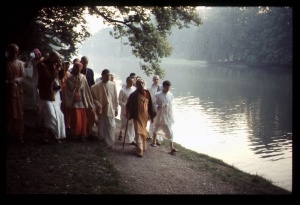SB 1.16.31: Difference between revisions
No edit summary |
(Vanibot #0054 edit - transform synonyms into clickable links, which search similar occurrences) |
||
| Line 25: | Line 25: | ||
<div class="synonyms"> | <div class="synonyms"> | ||
''ātmānam'' | ''[//vanipedia.org/wiki/Special:VaniSearch?s=ātmānam&tab=syno_o&ds=1 ātmānam]'' — myself; ''[//vanipedia.org/wiki/Special:VaniSearch?s=ca&tab=syno_o&ds=1 ca]'' — also; ''[//vanipedia.org/wiki/Special:VaniSearch?s=anuśocāmi&tab=syno_o&ds=1 anuśocāmi]'' — lamenting; ''[//vanipedia.org/wiki/Special:VaniSearch?s=bhavantam&tab=syno_o&ds=1 bhavantam]'' — yourself; ''[//vanipedia.org/wiki/Special:VaniSearch?s=ca&tab=syno_o&ds=1 ca]'' — as well as; ''[//vanipedia.org/wiki/Special:VaniSearch?s=amara&tab=syno_o&ds=1 amara]-[//vanipedia.org/wiki/Special:VaniSearch?s=uttamam&tab=syno_o&ds=1 uttamam]'' — the best amongst the demigods; ''[//vanipedia.org/wiki/Special:VaniSearch?s=devān&tab=syno_o&ds=1 devān]'' — about the demigods; ''[//vanipedia.org/wiki/Special:VaniSearch?s=pitṟn&tab=syno_o&ds=1 pitṟn]'' — about the denizens of the Pitṛloka planet; ''[//vanipedia.org/wiki/Special:VaniSearch?s=ṛṣīn&tab=syno_o&ds=1 ṛṣīn]'' — about the sages; ''[//vanipedia.org/wiki/Special:VaniSearch?s=sādhūn&tab=syno_o&ds=1 sādhūn]'' — about the devotees; ''[//vanipedia.org/wiki/Special:VaniSearch?s=sarvān&tab=syno_o&ds=1 sarvān]'' — all of them; ''[//vanipedia.org/wiki/Special:VaniSearch?s=varṇān&tab=syno_o&ds=1 varṇān]'' — sections; ''[//vanipedia.org/wiki/Special:VaniSearch?s=tathā&tab=syno_o&ds=1 tathā]'' — as also; ''[//vanipedia.org/wiki/Special:VaniSearch?s=āśramān&tab=syno_o&ds=1 āśramān]'' — orders of human society. | ||
</div> | </div> | ||
Latest revision as of 18:02, 17 February 2024

A.C. Bhaktivedanta Swami Prabhupada
TEXT 31
- ātmānaṁ cānuśocāmi
- bhavantaṁ cāmarottamam
- devān pitṟn ṛṣīn sādhūn
- sarvān varṇāṁs tathāśramān
SYNONYMS
ātmānam — myself; ca — also; anuśocāmi — lamenting; bhavantam — yourself; ca — as well as; amara-uttamam — the best amongst the demigods; devān — about the demigods; pitṟn — about the denizens of the Pitṛloka planet; ṛṣīn — about the sages; sādhūn — about the devotees; sarvān — all of them; varṇān — sections; tathā — as also; āśramān — orders of human society.
TRANSLATION
I am thinking about myself and also, O best amongst the demigods, about you, as well as about all the demigods, sages, denizens of Pitṛloka, devotees of the Lord and all men obedient to the system of varṇa and āśrama in human society.
PURPORT
To effect the perfection of human life there is cooperation between men and demigods, sages, denizens of the Pitṛloka, devotees of the Lord and the scientific system of varṇa and āśrama orders of life. The distinction between human life and animal life therefore begins with the scientific system of varṇa and āśrama, guided by the experience of the sages in relation with the demigods, gradually rising to the summit of reestablishing our eternal relation with the Supreme Absolute Truth, the Personality of Godhead, Lord Śrī Kṛṣṇa. When God-made varṇāśrama-dharma, which is strictly meant for developing animal consciousness into human consciousness and human consciousness into godly consciousness, is broken by advancement of foolishness, the whole system of peaceful and progressive life is at once disturbed. In the age of Kali, the first attack of the venomous snake strikes against the God-made varṇāśrama-dharma, and thus a person properly qualified as a brāhmaṇa is called a śūdra, and a śūdra by qualification is passing as a brāhmaṇa, all on a false birthright claim. To become a brāhmaṇa by a birthright claim is not at all bona fide, although it may be a fulfillment of one of the conditions. But the real qualification of a brāhmaṇa is to control the mind and the senses, and to cultivate tolerance, simplicity, cleanliness, knowledge, truthfulness, devotion and faith in the Vedic wisdom. In the present age, consideration of the necessary qualification is being neglected, and the false birthright claim is being supported even by a popular, sophisticated poet, the author of Rāma-carita-mānasa.
This is all due to the influence of the age of Kali. Thus mother earth, represented as a cow, was lamenting the regrettable condition.